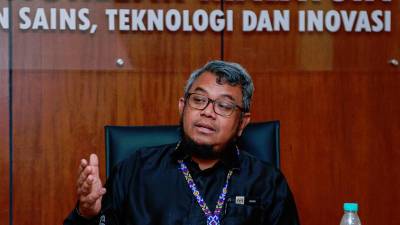BANGI: The Nuklear Malaysia Vision 2030 (WNM 2030) is being strengthened through the implementation of strategic policies guided by the principles of professionalism, innovation, and social responsibility, said Malaysian Nuclear Agency (Nuklear Malaysia) director-general Dr Muhammad Rawi Mohamed Zin.
He said that as the country’s lead agency for nuclear technology, it is committed to ensuring that every measure outlined in the vision, along with nuclear technology development initiatives, aligns with national science and technology policies, including those specific to nuclear technology, so that they can be implemented, refined, and transformed comprehensively in the short and long term.
“All the efforts and creativity of Nuklear Malaysia personnel will be harnessed towards realising the goals outlined in the vision. The strength of our shared values, encapsulated in the acronym N.U.C.L.E.A.R., guided by the motto ‘Nuklear Untuk Rakyat’ (Nuclear for the People), Insya-Allah will lead us to success,” he told Bernama recently.
The letter N stands for Novelty, U for Ubiquitous, C for Commitment, L for Leadership, E for Empathy, A for Attitude, and R for Respect.
For the record, Nuklear Malaysia has more than 300 researchers with specialised expertise across various cross-disciplinary fields related to science and engineering, including nuclear reactors.
The WNM 2030 is a strategic blueprint that outlines Nuklear Malaysia’s long-term vision and provides a clear, unified direction for all its activities moving forward.
The document details the strategic pillars, initiatives, key activities, performance indicators, and targets for the 2021-2030 period, while also supporting the National Nuclear Technology Policy 2030 (DTNN), launched in 2023.
When asked about Malaysia’s nuclear energy potential, Muhammad Rawi said the country is once again assessing the viability of nuclear power as part of its national energy source, noting that nuclear energy plays a distinct and vital role in the energy transition, not only in Malaysia but globally.
“This forms part of a long-term strategy to diversify towards cleaner and more sustainable energy sources. For now, we remain dependent on fossil fuels, which contribute heavily to carbon emissions.
“Nuclear energy presents a cleaner and more stable alternative, aligning with the nation’s commitment to achieving net-zero carbon emissions by 2050 and supporting investments in emerging sectors such as digitalisation and artificial intelligence (AI),” he said.
He explained that nuclear energy has the capacity to produce a large amount of power from a relatively small quantity of fuel, making it an efficient and viable option to meet the nation’s rising energy demand.
“Countries such as China and the United Arab Emirates (UAE), which Malaysians are familiar with, are already reaping the benefits of this technology despite being situated in expansive desert regions,” he said.
Unlike renewable sources such as solar and wind, which are dependent on weather conditions, nuclear energy offers a stable and continuous power supply, a key advantage for high-performance industrial sectors in this new era of emerging technologies.
“In terms of cost, it is true that the initial investment required to build a nuclear power plant is high. However, over the long term, operational costs remain more stable as nuclear fuel prices are generally more consistent than those of fossil fuels. In addition, advances in reactor technology have made nuclear energy more flexible and suitable for smaller, targeted-scale applications,” he said.
The government, through the Ministry of Energy Transition and Water Transformation (PETRA) and the Ministry of Science, Technology, and Innovation (MOSTI), has been mandated to develop the legal and regulatory framework governing the implementation of nuclear energy in Malaysia.
Nuclear technology development in Malaysia is regulated under the Atomic Energy Licensing Act 1984 (Act 304) and is monitored by the International Atomic Energy Agency (IAEA).
Malaysia is also bound by international agreements, including the Treaty on the Non-Proliferation of Nuclear Weapons (NPT) and the Comprehensive Nuclear-Test-Ban Treaty (CTBT). – Bernama
